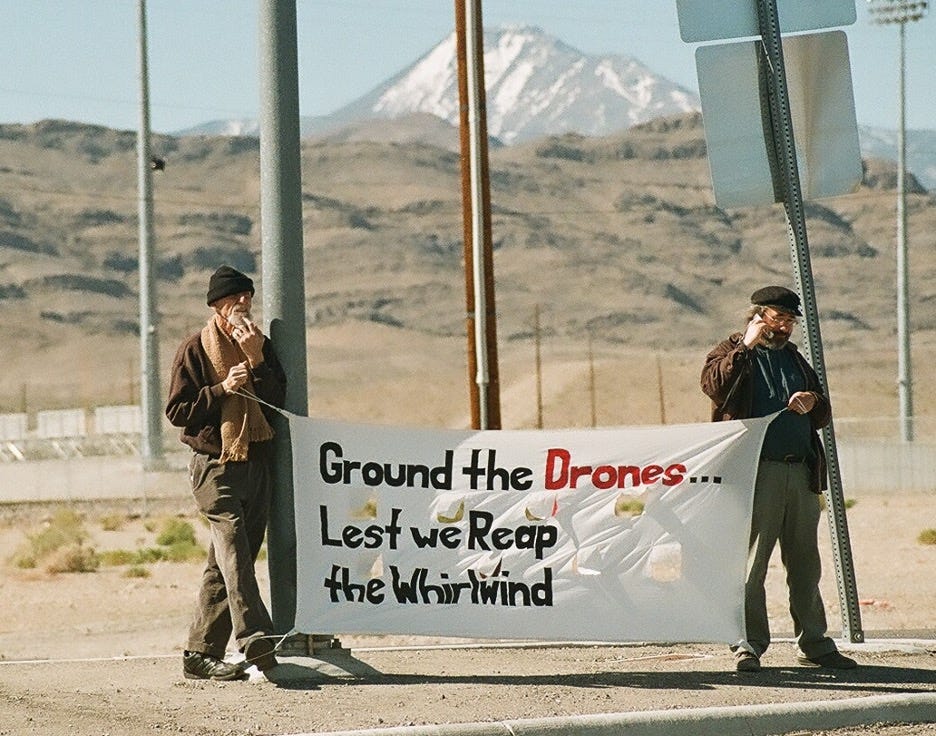13 September 2021. Shortages | Weapons
Corporate power has made our economies less and less resilient; autonomously killing people is wrong.
Welcome to Just Two Things, which I try to publish daily, five days a week. At the moment, I’m publishing a little less while away with intermittent internet access. Some links may also appear on my blog from time to time. Links to the main articles are in cross-heads as well as the story.
#1: Corporate power has made our economies less and less resilient
It’s not the UK economy that is experiencing shortages, although it is possible that our government’s bracing approach to Brexit has made shortages in Britain worse. The US economy is also experiencing shortages in a wide range of goods, and Matt Stoller, whose newsletter Big is devoted to stories about the effects of monopolies, dived last week into why this might be.
Along the way, though, he notes that economists don’t really have tools to measure shortages—they only see the inflation that might result from shortages. If the transaction never takes place, because a good or service was unavailable, it remains invisible to economics.
Stoller has some credibility here, since he wrote a piece very early in the pandemic arguing that one of the longer term effects of the pandemic would be shortages.
The US problem is pretty definitely a real one:
There are shortages in everything from ocean shipping containers to chlorine tablets to railroad capacity to black pipe (the piping that houses wires inside buildings) to spicy chicken breasts to specialized plastic bags necessary for making vaccines... The debate over shortages has become so important that it is now a key political problem for the Biden administration. And yet, policymakers have no institutional measurement system useful for tracking it.
The latest Federal Reserve Beige Book mentions the work ‘shortage’ 80 times, while there’s an active discussion of shortages on a sub-Reddit. The formal and informal data is pointing the same way.
So what’s going on here? There are, clearly some pandemic-related effects. Stoller also sees some effects from the Federal Reserve printing money (he has a particular view of the effects of this that I don’t share, but it does create an effect that does matter, of too much loose money chasing returns that are hard to find in low-growth economies).
But in general, he thinks that American policy-makers have followed the advice of economists in encouraging scale, because said economists believed that corporate efficiency increased with size. The result is that the economy is now much less resilient to shocks.
So if that’s the hypothesis, what’s the mechanism? Stoller writes about Uber’s impact on the US metropolitan taxi market (admittedly a first world problem):
Uber’s attempt to monopolize the taxi market with cheap prices, and the resulting shortage years later after the market was ruined, is a very simple way to understand the situation, if you imagine that taking place across multiple industry segments beyond taxis. Monopolistic business models often appear to be efficient or good for consumers - for a time - but end up destroying productive capacity on the backend, which then creates or worsens a shortage. In that case, cab drivers, who used to be able to make a reasonable living, haven’t really come back.
But, for example, we have seen exactly the same happen in the American market for lumber:
In the early 2000s, Ross-Simmons Hardwood sued lumber giant Weyerhaeuser Co. A key cost for lumber mills is the price of logs, and Ross-Simmons accused Weyerhaeuser of artificially paying more for logs to drive competitors out of business. This practice was similar to Uber incurring losses to subsidize the cost of rides to underprice taxis and capture the market, only in this case it was Weyerhaeuser incurring losses to keep the price of logs higher than they should be. As (Sandeep) Vaheesan put it, this behavior changed the market. “Why invest in sawmills,” he asked, “if dominant players will buy up necessary inputs as a means of crushing the margins of competitors?”
Incidentally, a jury found for Ross Simmons Hardwood, but the Supreme Court later found for Weyerhaeuser.
We’ve been seeing occasional supply spikes for 20 years now. The impact of the Fukushima earthquake caused shortages of broadcast quality video tapes, for example and also caused supply problems for the world car market. But the pandemic has shown up a whole lot of supply chains as being vulnerable to shock:
As one trucker noted, his Freightliner is in the shop due to a broken air line, and he was told that shop had seven other trucks sitting there with a similar issue, and so they can’t truck anything. That specialized part to repair his vehicle is no longer made domestically, but must be… trucked in from Mexico or Canada. See the problem?
(MacDonald’s soft serve ice cream cone. By Alpha/flickr, CC BY-NC-SA 2.0)
One of the ways in which monopolies work is that they exploit bottlenecks for profit. Stoller sees five types of play here (each of these has a lot more detail behind it):
1) Monopolies manipulate prices and lower supply. Unregulated firms with market power raise prices, cut wages, and reduce supply. That’s just what they do.
2) The Keurig Interoperability Problem: Then there are the artificial bottlenecks produced on purpose to exploit market power.
3) Right to Repair, or the McDonald’s Ice Cream Problem: Another artificial bottleneck created to facilitate certain corrupt business models is to prevent firms from repairing their own equipment.
The MacDonald’s example: MacDonalds “do not allow franchise owners to repair their own equipment, because allowing that would jeopardize the fat maintenance equipment fees they get from servicing overly complex machines.” (And see also John Deere’s same strategy on tractors.)
4) Infrastructure Monopolies: One of the most problematic monopolies is that of Taiwan Semiconductor (TSMC), which is the main fabricator of high-end chips used in everything from phones to computers to cars, whose customers include every major tech firm. Semiconductors, like oil, are infrastructure at this point, going into a large swath of products. Infrastructure monopolies are bottlenecks whose effects cascade down supply chains.
5) Power Buyers and Economic Discrimination: Then there’s price discrimination to remove small players from the market. One BIG reader, an administrative assistant at a small college, noted she’s seeing “shortages in previously plentiful food items.”
Stoller’s underlying hypothesis is that when monopolists concentrate power they also concentrate risk. But, as with other crises, the risk is socialised and the profits are privatised. There’s no quick policy fix for any of this. But we could start by not assuming that—in competition policy, on both sides of Atlantic—that the only measure of public harm or public benefit is whether consumers see lower prices. When it comes to monopolies and supply chains, those lower prices (as we’ve seen with Uber) are a form of switch and bait. But, as Diane Coyle has said, we’re starting to see a turn in our approaches to competition policy. Shortages make the need for this more acute.
#2: Autonomously killing people is wrong
One of the curiosities of 9/11 is that the air attack on the Twin Towers led to the development of remote drone attacks on ‘suspects’—often wrongly—by the US military.
In 20 years, the technology has moved quickly, becoming increasingly remotely operated, and increasingly autonomous.
So it’s worth noting the piece written by Julia Angwin, the editor of The Markup, to mark the anniversary of 9/11:
Increasingly, drones are being built that do not require a human pilot and can use artificial intelligence to identify targets.
The rise of lethal autonomous weapons systems (LAWS) that can make their own decisions about who to kill is truly one of the most terrifying legacies of the past 20 years. Proponents of the technology argue that autonomous weapons can help in places where a drone is not able to communicate with its base, and its human operator. Critics say that humans should always be in charge of killing decisions.
She explores some of these issues in an interview with Liz O’Sullivan, now the CEO of Parity, a platform that automates model risk and algorithmic governance, and an activist in this area of “robot arms control”. O’Sullivan became an activist after working for a firm making such weapons and realising how quickly the technology was improving.
O’Sullivan and other campaigners are now pressing for a UN-backed treaty to agree controls on autonomous weapons. There’s already a UN Convention on “Certain Conventional Weapons” that has already restricted certain types of weapon technologies.
Image: Brian Terrell, with Father Louie Vitale, at a 2009 anti-drone war protest at Creech Air Force Base, outside of Las Vegas, NV. [Source: Jeff Leys, via CovertAction magazine]
Activists are trying to develop a treaty within this framework that achieves the following:
We want to make sure that humanity retains meaningful human control over the application of force in all contexts.
We want to prohibit the use of these kinds of weapons against humans. We want to prohibit them from being used in inhabited areas. That’s sort of the bare minimum, and that’s the result of a ton of negotiation and consensus building.
As soon as you start trying to define weapons for treaty purposes, the wording becomes a matter of detail. For example, one of the sticking points in discussions so far is about not outlawing weapons that are part of autonomous defence systems against rocket or missile attack. The focus of the treaty would be on weapons designed to attack humans:
(O)ne of the worst-case scenarios is ethnicity-based genocide, and that would be easily empowered by this technology. After all, that’s what AI does: It classifies things into groups. It’s very good at saying, this thing is different from this other thing in some visually identifiable way. When you apply that to people, it breaks down. You get a situation where an algorithm says let’s treat this group of people differently from another. That can be either give them a loan, hire them, fire them, or it can be kill them or don’t kill them.
The whole piece is here.
j2t#164
If you are enjoying Just Two Things, please do send it on to a friend or colleague.




